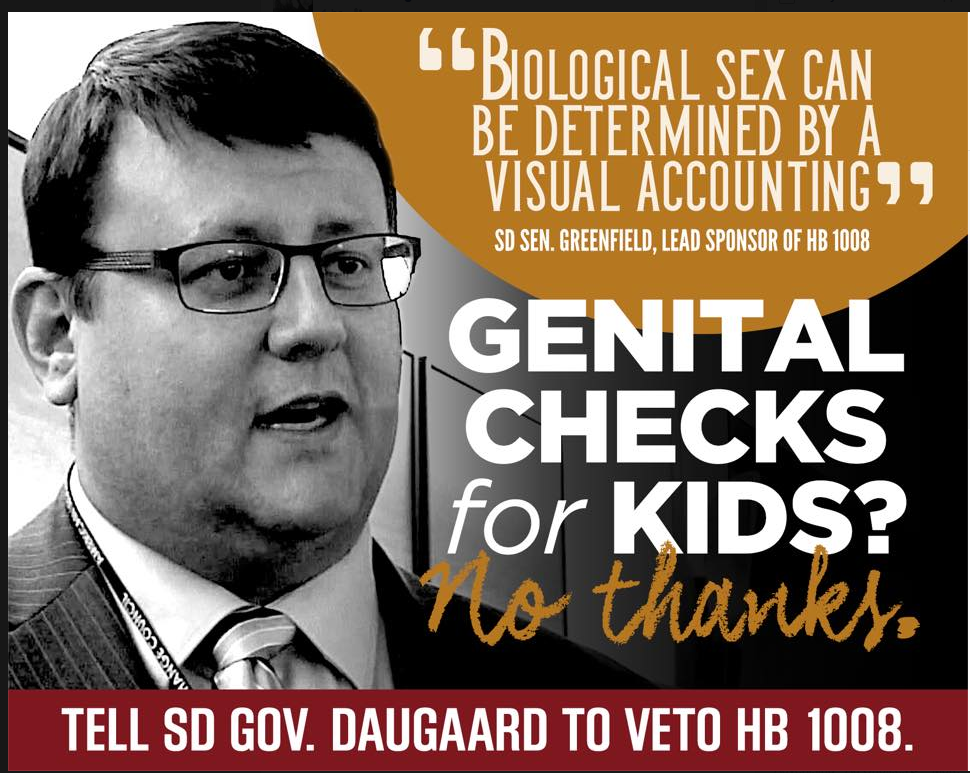
The Road Ahead: Fighting Anti-LGBT Legislation
Blog Search

This blog post was co-authored by Jon W. Davidson, Lambda Legal's National Legal Director and Eden/Rushing Chair, and Jennifer Pizer, Lambda Legal Senior Counsel and Law and Policy Project Director.
HB 1008 is now headed to the desk of South Dakota Gov. Dennis Daugaard. It proposes to restrict students’ access to restrooms and locker rooms according to chromosomes and birth certificates.
Legislators said it was needed to protect other people from transgender youth, to whom it contemptuously was said, “You’re so twisted you don’t know who you are.”
HB 1008 is the first of this type of attack on transgender people to get this far. But it represents a fast-spreading toxin of ignorance, contempt and political opportunism at the dire expense of some of our most vulnerable community members.
In addition to the more than 40 anti-trans state bills that have erupted in states so far this year, approximately three times that many state bills aim to expand religious rights to discriminate against LGBT people, in contexts such as schools, medical clinics, stores and government offices.
Our opponents simultaneously have been attacking standard municipal anti-discrimination measures, such as Houston’s Equal Rights Ordinance, with vicious anti-transgender campaign slogans.

This year’s flood of more than 175 anti-LGBT bills is nearly a 50 percent increase over last year’s onslaught. And last year’s was a geometric increase in the attacks of the year before.
Recently, as these election-year LGBT-bashing bills have proliferated, some gay bloggers and reporters have started asking what members of the community also must be wondering: Are our LGBT organizations prepared to deal with this unprecedented level of legislative and ballot attacks?
Lambda Legal has been preparing steadily during the past three years and implementing strategies to fight back and win. At the same time, we know our opponents are well-funded and determined, and winning will not be easy.
We are not surprised by the ferocity of the backlash we are seeing – history shows that every major civil rights advance prompts angry and desperate attempts to reverse it. And our community has been seeing “potty police” bills – and stopping them – for three years now. The same goes for the state “religious exemption” bills – for which our community’s success rate, thanks to intense work by teams of advocates and allies, has been about 90 percent.
So we are not surprised that a key part of our opponents’ strategy now is to attack some of the most marginalized members of our community, including transgender youth. And frustratingly, although quite a number of this year’s bills already have been defeated, several horrific bills have passed one or both houses of state legislatures.
These include South Dakota’s HB 1008, discussed above, as well as Georgia’s HB 757 (which encourages private businesses, individuals and medical and social services agencies to discriminate against anyone in Georgia on religious grounds and has passed that state’s Senate), Tennessee’s SB 1556 (passed by the state Senate, which would permit licensed counselors and therapists to turn away LGBT patients on religious grounds) and Oklahoma’s HB 1523 (which would provide legal shelter to those who discriminate against LGBT people, and has passed the state House).

As in past years, defeating these and similar measures is no simple task. These bills are packaged and promoted by national anti-LGBT groups like the so-called Alliance Defending Freedom. We are up against daunting, arch-conservative super-majorities in many of the state legislatures in which these bills are pending.
This being an election year, we are also dealing with the apprehensions of some legislators about how failing to support these bills might affect their upcoming primary battles, and some governors who align with the most conservative members of their legislatures.
Our movement has been here before and we know the way forward: We need a strategic mix of legal action, public education and policy advocacy.
In our experience, legal victories can often lead the way. For example, in the early 1990s, we saw waves of ballot measures like Colorado’s Amendment 2 that sought to bar sexual orientation anti-discrimination protections, until Lambda Legal and our co-counsel convinced the Supreme Court that such measures were unconstitutional in Romer v. Evans.
These were followed in the 2000s by dozens of state statutes and then constitutional amendments that sought to perpetuate same-sex couples’ exclusion from marriage. Once again, with few exceptions, we lost over and over in state legislatures and at state ballot boxes before Lambda Legal, our sister legal organizations and the private bar convinced more courts that these measures were unconstitutional. Court victories coupled with national education and skillful advocacy on the ground moved public opinion until we were able to win legislative and ballot fights in multiple states.

Attorney and former Lambda Legal Board co-Chair Paul Smith (L) with John Lawrence and Tyron Garner (R), clients in Lambda Legal's landmark Lawrence v. Texas Supreme Court case
As we have seen in repeated cycles over the past 50 years, it is incredibly challenging to quickly change the deep-set, fear-based responses to which soundbites like “no men in women’s bathrooms” or “your religious liberty is under attack” play. That is why we often do better – at least at first – in courtrooms, where distorted slogans and appeals to prejudice can be subjected to dispassionate examination based on law, logic and evidence.
Lambda Legal and other legal groups continue to advance public understanding, law and public policy by, for example, litigating cases around the country to even more firmly establish that Equal Protection doctrine and legal bans on sex discrimination protect transgender students’ and employees’ rights not to be denied access to the facilities that match their identity and same-sex spouses’ right to equal employment benefits, and that there is no religious right to harm others.
But we are not just relying on the courts and, given how much the Supreme Court’s composition now hangs in the balance, it would be foolhardy to do so. We all need to do everything we can to defeat anti-LGBT bills and to preserve existing protections. And, if we can’t defeat bad bills altogether, we must try to limit their damage. Lambda Legal and our sister organizations are working on strategies to do just that by:
1. Developing counter-narratives to the ones our opponents are driving.
One of the ways we won marriage was getting people to think about the harms marriage discrimination inflicted on the children of same-sex couples and to lesbian and gay widows and widowers. Most Americans are good people who do not want to hurt their family members, neighbors, co-workers or co-congregants. Showing the actual harms always has been crucial to helping people evolve to oppose anti-LGBT measures.
The same is true now for the anti-transgender “potty police” bills, so similar work is underway to help people understand how these bills are likely to lead both to terrible damage to transgender people and to the absurd proposals we already are hearing (such as genital examination of young people by school officials!).
When Kyle's classmate posted an anti-transgender Tweet about him, he decided to fight back. Read his story: bit.ly/1KaSMQC
Posted by Lambda Legal on Monday, 14 September 2015
We are also demonstrating how allowing business owners to impose their religion on their employees and customers imperils not just LGBT people, but also women, unmarried parents, people with certain disabilities and everyone who has different beliefs than their boss, landlord or a prejudiced store manager.
2. Amplifying the voices of individuals who can speak in passionate, personal terms about the true impact of these measures in ways that reach voters’ and legislators’ hearts and minds.
Despite increased visibility, there remains widespread ignorance and misinformation about transgender people. Thus, it is critical that we create ever more opportunities for transgender young people and adults to tell their stories, while continuing our work to make it safe for more of them to do so.

Lambda Legal client Corinne "Cori" McCreery
Lambda Legal recently shared a letter our former client Corinne McCreery wrote to South Dakota’s Gov. Daugaard about how she had left the state because she no longer felt safe living there as a woman who is transgender. Other Lambda Legal clients and staff are speaking out about these harmful measures in other states as well as more generally about the rights of transgender people.
Referencing the alarming suicide rate among transgender youth, ACLU attorney Chase Strangio likewise has spoken powerfully about why, if he were a student in a state with a law like HB 1008, chances are that he would not survive to adulthood. Outreach and support for additional transgender youth and adults who feel safe, able and ready to speak out are expanding nationwide. Much more of this is needed.
3. Inviting experts to rebut imagined fears and to explain authoritatively the dangers these measures pose to the health and wellbeing of our community and of the nation at large.
Lambda Legal recently submitted a brief to the U.S. 4th Circuit Court of Appeals that pulled together school administrators and educators from school districts across the country that have policies that respect the gender identity of students. In the brief, they shared how those policies help students thrive and have had zero negative consequences.
Our work is far from done. Here’s one of our long list of priorities for the work ahead. Learn more: http://bit.ly/1f6eACg #LGBT #Youth
Posted by Lambda Legal on Friday, 3 July 2015
On February 19, the American Academy of Pediatrics, the American Counseling Association, the American School Counselor Association, the Child Welfare League of America, the National Association of School Psychologists, the National Association of Social Workers and the National Education Association together issued an open letter decrying how measures like HB 1008 “would compromise the safety and well-being of the young people we all have the duty and obligation to support and protect.” Broadly publicizing such expert opinions will continue to be crucial, as it has been in successful past efforts to stop state bills that put LGBT youth and others at risk.
4. Building ever stronger local, state and national LGBT groups.
With the myopic view that marriage equality was the endgame, some foundations and donors have cut back on support of LGBT groups, which sadly has contributed to the folding of some state and local LGBT organizations. Such short-sighted defunding ignored the escalating threats we face, which make our community’s political, educational, social service and legal nonprofit groups more important than ever.
Everyone has an important role to play, but groups with expertise in developing messages, campaign action plans and legislative drafting, and who have political connections and a track record of success strategizing, mobilizing and coordinating all our efforts, are essential.
Over the past three years, Lambda Legal has been enhancing our capacities for this work by adding policy advocacy staffing in all five of our offices –especially those in Atlanta and Dallas, by expanding our Transgender Rights Project staffing, and by creating a national Law and Policy Project with staff dedicated to helping state advocates and campaigns. More is in the works and we are very grateful to the funders who recognize both the perils and the potential of this moment, and whose increased funding is making this possible.
Help us welcome Simone Bell, former Georgia State Representative and the new Regional Director of our Southern Regional Office in Atlanta, with a like!Learn more here: bit.ly/1GBZnp7
Posted by Lambda Legal on Friday, 30 October 2015
5. Developing more allies.
There are not enough LGBT people to win these battles alone.
Many non-gay people were powerfully instrumental in causing the shifts in public support for marriage equality – particularly President Obama, racial justice organizations and religious leaders who spoke about compassion and not judging others. Corporate leaders likewise were essential to defeating measures to permit discrimination based on religious views in Arizona and Indiana.
As we fight bills that attack transgender people, the need for great numbers of cisgender allies is even bigger. Fortunately, people are stepping up. Numerous women’s rights groups – including the National Women’s Law Center, Legal Momentum, Equal Rights Advocates, Gender Justice and Legal Voice – have already joined friend-of-the-court briefing that rebuts the notion that anti-transgender restroom bills protect women.
Lambda Legal and other groups are asking broadly for this type of support, as well as for opposition to overbroad religious exemption laws, while offering our own reciprocal support against other forms of discrimination and restrictions of individual rights.
There are many steps we all can take to help with this effort. We must demand that candidates seeking our community’s support speak out more vocally on these issues. Additionally, we should all work on counteracting the myths being pushed by anti-LGBT activists by educating our family members, friends, neighbors and co-workers about these issues, and then asking them to do so as well.
There is a formidable amount of work ahead, and its shape is evolving continually as we learn what works best. That we may lose some battles does not mean we panic or ignore the key lessons of nearly 50 years of progress. To be effective, we need to be clear-eyed that the deck is stacked against us in far too many political arenas at present, often due to improper gerrymandering, voter suppression measures and the distortions to the political process caused by Citizens United.
But we can whittle down the odds with time. On the way, we need to try not to give an inch so as not to embolden our opponents even further. We need to educate our communities and allies even more about the urgency of pushing back as hard as we all can. We need to mobilize coordinated responses like those described above. We all need to register to vote and cast our ballots wisely. And we need to sustain ourselves and each other for what unfortunately is likely to be a long-term fight.



